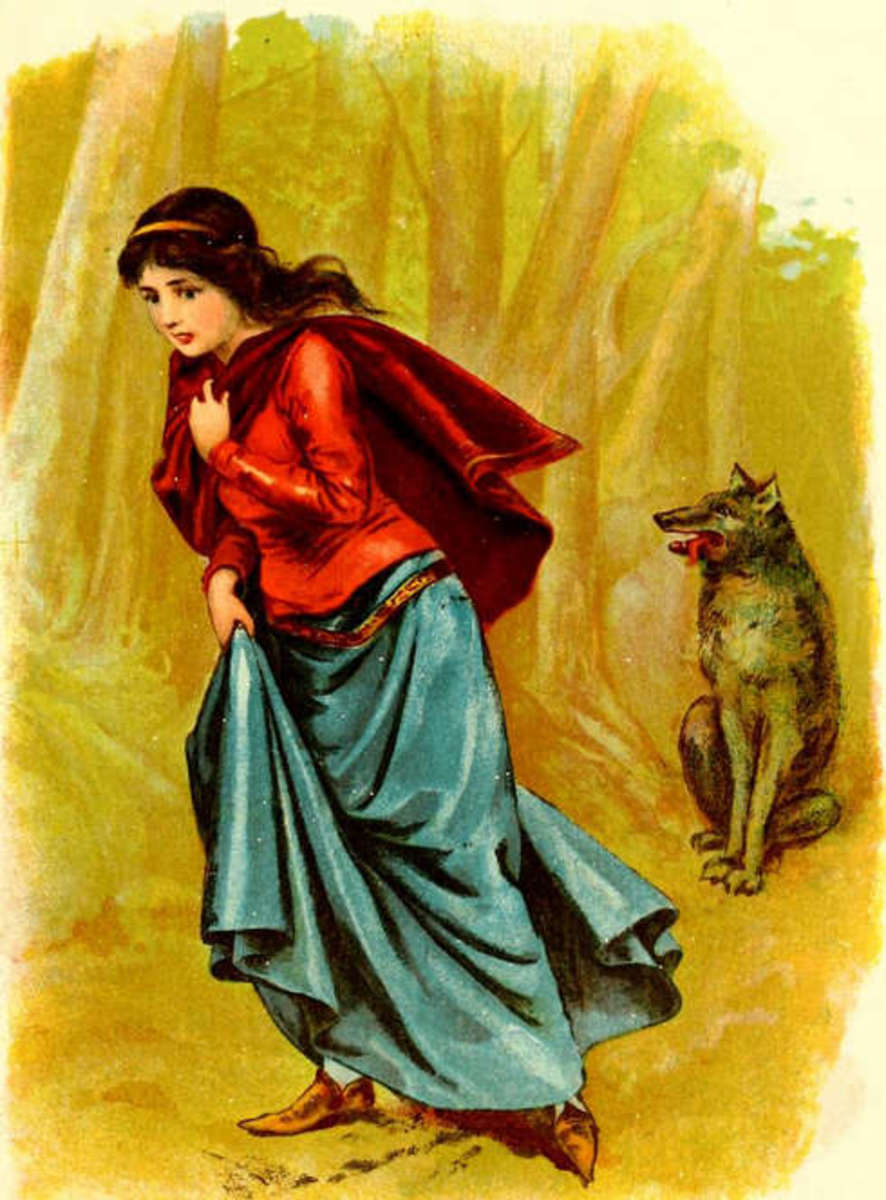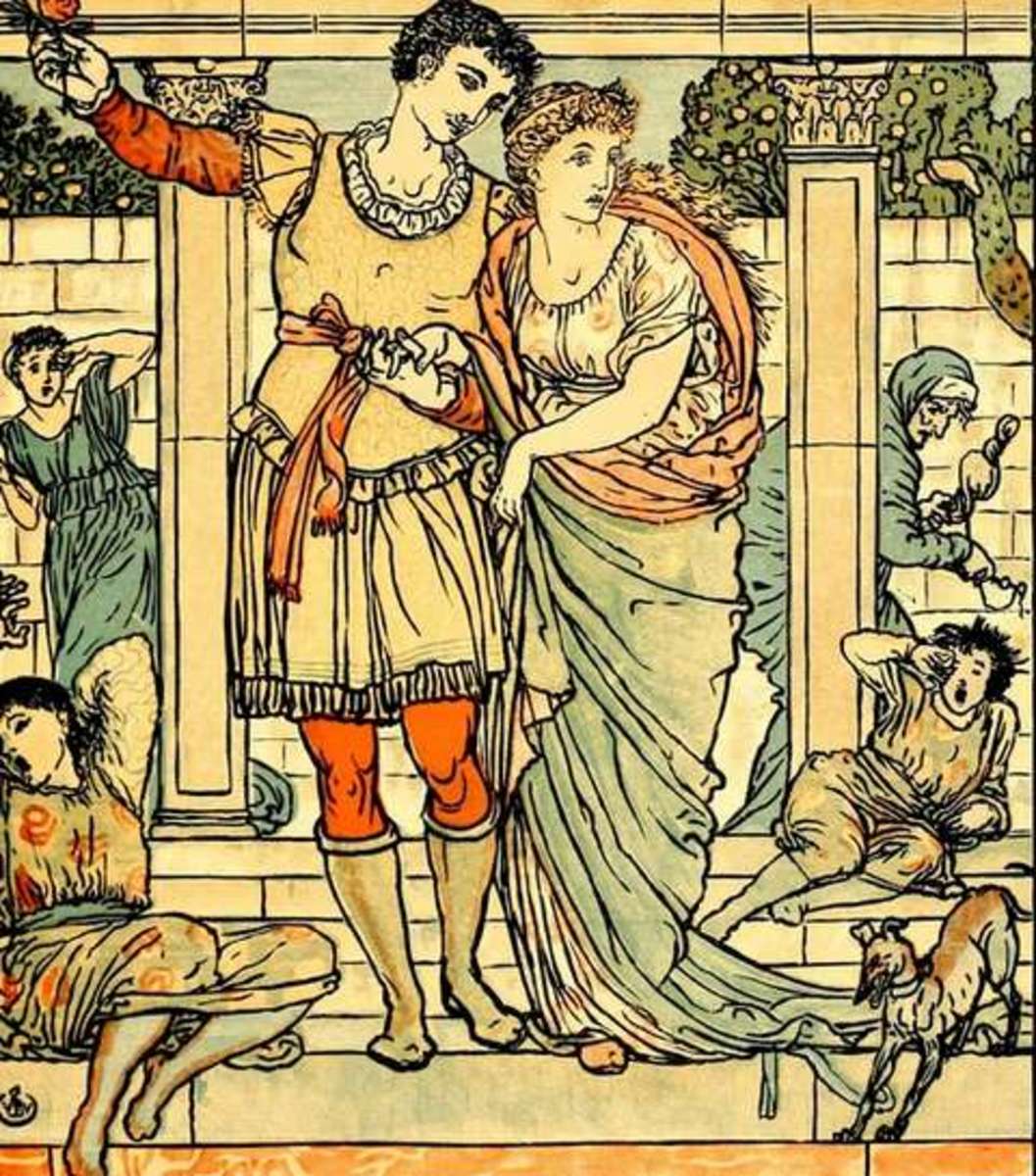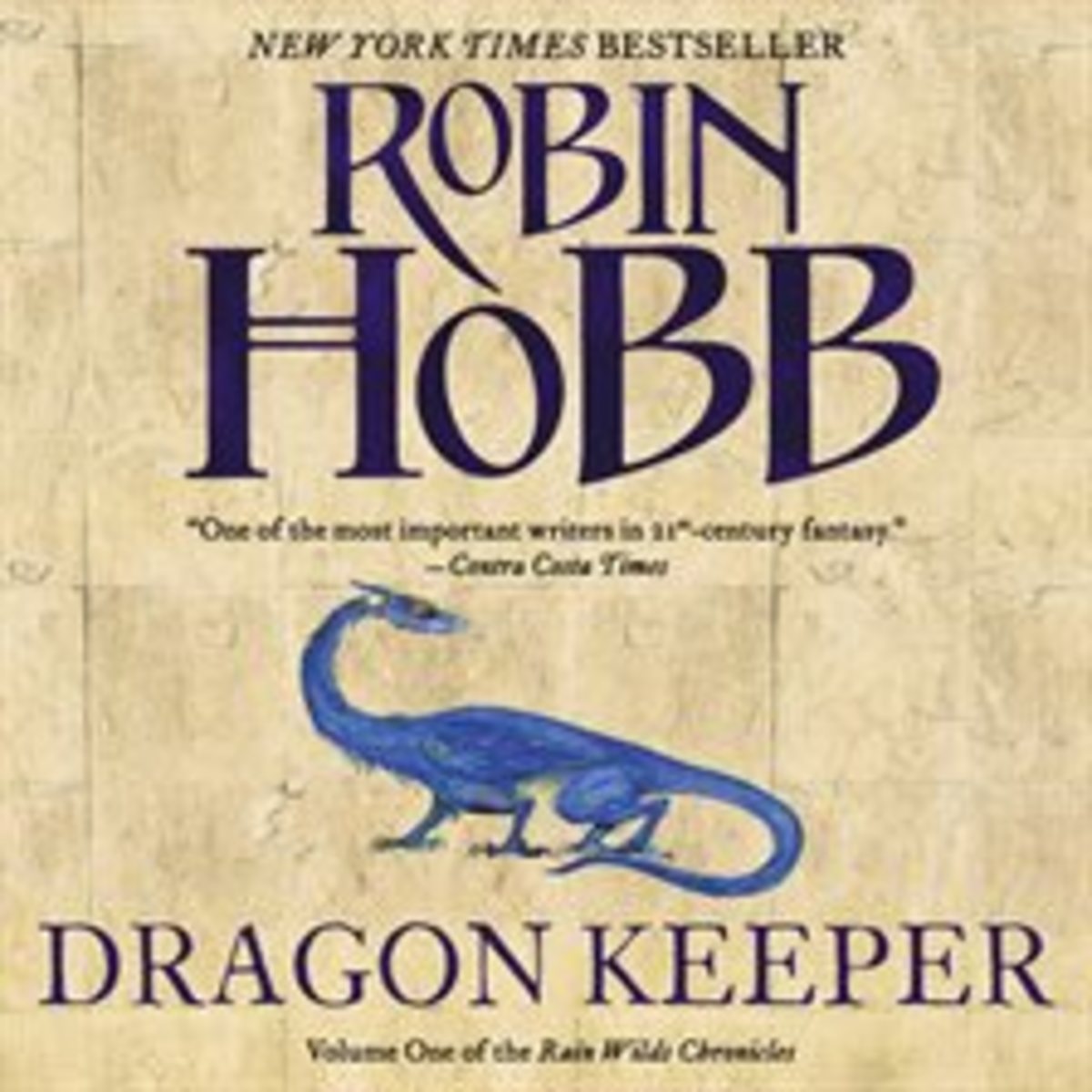Audiobook Classics: Don Quixote the Ingenious Gentleman of La Mancha
An Awesome Narration
Unfortunately I can't find any background on Roy McMillan, the narrator, other than he's narrated about 20 other books. The audiobook experience is an entertainment beyond my greatest expectations. McMillan is simply amazing in his ability to make subtle shifts in timbre, tone, pacing, accent, and pitch to differentiate the characters, which rival the numbers we might find in a Dickens novel (he also narrates Oliver Twist). His poetic delivery of all the “thous”, “thees”, “whilsts” and “wherefores” makes what might be confusing on a page ring clear to the ear. Since completing the novel, I've gone back to certain parts just to hear McMillan's wonderful treatment of The Knight of The Rueful Countenance and his sidekick, Sancho.
Follies of Humanity
Trying to articulate a “literary” reaction to the Ingenious Gentleman Don Quixote of La Mancha, or to perhaps shed some sort of fresh light on the story is perhaps something the Knight of the Rueful Countenance might endeavor. Like looking at windmills and wineskins and seeing giants, or looking at inns and seeing castles, trying to assign a grand purpose to Cervante’s efforts over and above his simple desire to tell an entertaining story depicting the follies of humanity in the service of an all-powerful God is to see the great novel as something other than what it is.
Unfortunately it’s probably impossible to read such a seminal work without opening the Pandora’s box of high-minded literary analysis. Critics speak of the increased depth of subject matter in Part II, and of the fact that Cervantes now knew that the whole world was watching and waiting for Quixote’s adventures to continue after Part I was completed. The fact that Part II originally appeared as what we might today call “fanfiction” added another very public dimension to Cervantes second half work. Regardless, like most literary criticism, the aim of all the analysis over the years is an attempt to sum up, label, categorize, pigeonhole, and otherwise characterize the work as having some sort of central purpose.
I don’t for a minute believe that Cervantes was doing anything more than weaving a yarn that would entertain his readers. Was he consciously poking fun at the stories of Chivalry? Of course, that’s the entire platform for his story, however his intention isn’t to consistently tear it down, rather it’s simply to use it as a point of reference by which the reader can decide if the Don’s chivalric intentions are simply the machinations of a madman or if there is still some value in the old laws, regardless of how society treats him.
Of course Cervantes great genius and the genius of all the great authors is the ability to tell a story that, taken at face value, is completely engaging and entertaining, but at the same time operates at deeper, more thought-provoking levels perhaps even without the author’s intention.
Miguel de Cervantes

A Talkative Team
To me, the most interesting aspect of the story lies in the relationship of the Knight and his Squire, two interoperable characters that, together, represent overriding theme of what results from “blind faith”.
The theme is illustrated by a primary stylistic characteristic of the novel: the reliance on monologue and dialogue to convey the thoughts and feelings of the characters. Their interactions with each other have very little description of physical qualities: gesture, movement, standing, sitting, facial expression, body language; outside of the occasional embrace or kissing of the feet and general prostrations it can be difficult to visualize the characters when they’re into some of the interminable soliloquy. Obviously Cervantes wanted us to focus on the words, not the actions, of the exchanges. That’s not to say, however, that the soliloquys, no matter how overbearing, ever get repetitive. Nonetheless, the Knight and his Squire in particular have the gift of gab.
It’s through these long drawn out verbal exchanges that the strange love/hate, master/slave, father/son, patient/nurse, God/Believer relationship of the Knight and his Squire, Don Quixote and Sancho Panza, is revealed. From the very beginning it is a bizarre relationship, for it’s clear that neither of them are playing with a full deck.
“...Don Quixote approached a farmer who was a neighbor of his, a good man - if that title can be given to someone who is poor - but without much in the way of brains. In short, he told him so much and persuaded and promised him so much, that the poor peasant resolved to go off with him and serve as his squire. Among other things, Don Quixote said that he should prepare to go with him gladly, because it might happen that one day he would have an adventure that would fain him, in the blink of an eye, an island, and he would make him its governor.” (p. 55)
The Famous Picasso
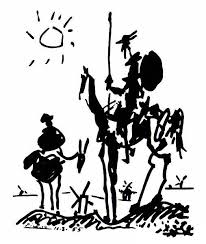
Sancho's Island
That Alonso Quejada suffers some kind of psychotic episode from his complete immersion in tales of Chivalry that he truly believes he is Don Quixote, The Knight of The Rueful Countenance, is entirely believable. Were such a thing to happen today - and I don't doubt that somewhere somebody at this moment believes they are not the person everybody believes them to be - we wouldn't question it, though it's unlikely they would be roaming free. However, it's a bit of a stretch to believe that this farmer turned squire is such an idiot to believe that Don Quixote would have it in his power to make him governor of an island. But suspend our disbelief we do, as it sometimes seems Sancho Panza is doing, and sometimes not.
Sancho's role as a spineless buffoon, unwilling to take up the sword on behalf of his master (which according to the rules of Chivalry he is forbidden to do, conveniently), along with his alternately rebellious/obedient behavior, is to my mind a worthwhile analysis to undertake in the reading of Don Quixote. For he can be an extremely logical idiot, a voice of practicality and reality on the one hand, but a voice of blind faith on the other. That the narrator, whom Cervantes took care separate from himself, claiming as he does to have “discovered” the book at a bazaar, takes many opportunities to remind us that Sancho is an illiterate simpleton (he even qualifies his description of Sancho as a “good man”) is unusual because it’s one of the few instances where the narrator “editorializes” on character traits in the entire narrative. We might assume that Cervantes means to bring special attention to Sancho so that we might say that, aside from believing his master’s intent to provide him with the governorship of an island, his behavior is the most practical, logical and level-headed of all the characters in the novel.
While the business of the island gets a bit tedious over time, Cervantes keeps hammering it home. Why? And why does Cervantes include the conversation with Teresa in Part II Chapter V, where the narrator admits that parts of Sancho’s speech are apocryphal? Isn’t that the same as the author saying that the character is going to step out of character to deliver a “word from our sponsor”?
“(All the words that Sancho says here are the second of his statements that cause the translator to consider this chapter apocryphal, for they far exceed the capacity of Sancho…)” (p. 489)
Why does Cervantes take such pains in making this curious move? Was he concerned that to give Sancho such faith in the possibility of upward mobility in society would be beyond his mental capacities? We’ve heard Sancho speak plainly and logically many times in the narrative up to now, so I don’t find his arguments with Teresa about self-determination and taking advantage of his good luck at being Squire to the Knight be out of character at all. What’s rather hard to swallow is that Theresa takes her husband seriously enough to wage a counter argument.
Basically Sancho is pleading with his wife to show a little ambition for the sake of the children, while Theresa takes the position that God has stationed the people of the world where they are for a reason, and it’s not proper to question one’s station or try to move above it. The argument illustrates the emerging idea that man is free to determine his lot in life.
Sample Audio
A Great Story Well Told
As I listened to the audiobook version and read some of the text, I had a distinct feeling that It would be a mistake to try and judge this seminal and enduring classic novel by anything resembling 21st Century critical standards, not because the writing or the stories are inferior in any way to anything written in the last 400 years, but because it follows a style of storytelling that has all but died out.
To really "get" Don Quixote, we must recognize one single most important truth about Cervantes masterpiece: it is intended to be read aloud, as was the manner of the day. While literacy was steadily on the rise post-Renaissance, still most people could neither read nor write, so the style of storytelling in Don Quixote is a continuation of the manner by which stories had been told for centuries. Like his contemporary Shakespeare, Cervantes appears most concerned with how his lilting, sometimes flowery Old Castilian speech of the Knight sounds when read around the hearth or at a picnic in the meadow, rather than how it might rattle around the brain where it can get painfully repetitive and overcooked. Yes, good point. And of course the Old Castilian language that Cervantes uses for Don Quixote alone, which we now consider archaic, can be pretty tedious to read and even listen to after awhile, though it’s certainly no fault of the author.
Audiobook Jacket
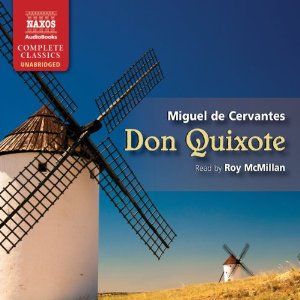
The Hero and The Fool
As my friend and mentor David Allen Cates pointed out, (and I paraphrase) "what makes this book great is its depiction of the thin line between the hero and the fool. Obviously, both Q and Panza are easily seen as fools. But their doggedness, the fierceness with which they hang onto their illusion, is heroic. We are all driven by our illusions, our dreams of success , not for mere personal glory, but also moral victory. They are both trying and trying to do the right thing, over and over again, failing miserably, wandering blindly, but they are unstoppable! They dare to invent, dare to believe, dare to try, according to their limited lights to live a meaningful life. This is what makes a book archetypal.
This is what every good story concerns itself with. A character with a view of the world, an illusion, a slim glimpse of what it’s all about, attempting to get on with it, to act. With Quixote, this human condition is beautifully articulated by its exaggeration. And after spending perhaps hundreds of pages with them, laughing AT them, well, after hundreds more, we can’t help but admire them to some degree—to see their heroism. It’s a very thin line between the hero and the fool, and we have both of those things inside us, and these two characters walk the line as well as anybody in literature. All we have to do is move our head just slightly from side to side—and with the change in perspective, we can see them as heroes, as fools, and then as heroes again. Their human faith and their illusions make them invincible. The limits of their human capacity to see clearly make them fools."

